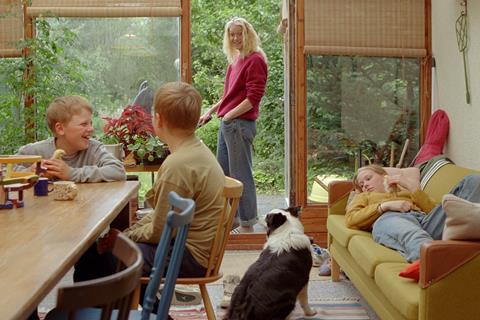Iceland’s Hynur Palmason returns with film about the end of a marraige.

Dir/scr: Hlynur Palmason. Iceland/Denmark/France/Finland/Sweden. 2025. 109mins.
There’s a point somewhere towards the end of a marriage breakup when the sense of what might have been is all-consuming. The imprint of the relationship is everywhere, and on everything. Hlynur Palmason’s tender, unexpectedly playful account of the breakup of the marriage of Anna (Saga Gardarsdottir) and Magnus (Sverrir Gudnason), told in collage form, digs into that specific moment – the point at when even the most mundane activity is a reminder of the love lost, and the love that remains. There’s an undertow of melancholy certainly, but also a light, buoyant quality to a film that cherishes its moments of humour and absurdity.
An intimate picture which flirts with fantastical elements
Palmason returns to Cannes with this fourth feature, this time in the Premiere strand, following his multi-award-winning Un Certain Regard breakout success of Godland. It’s a more intimate picture which flirts with fantastical elements, to varying degrees of success. But the film shares with Godland an evocative use of the spectacular Icelandic landscape (less savage and threatening here, and more of a playground for the imagination).
It’s a picture rich with metaphors. Memories are as persistent as the weathered rust stains on artist Anna’s canvases; Second World War sea mines that get snarled in Magnus’ trawler nets are like the argument flashpoints that hreaten to destroy everything. The meaning behind the giant, vengeful rooster that stalks Marcus in his sleep is less clear, but then most families have in-jokes and private lore that is baffling to anyone outside the circle.
Anna, a struggling artist, has just lost her harbour-side studio. The opening shot, taken from inside the empty building, shows the entire roof wrenched off by a crane – another visual metaphor, perhaps, for the domestic upheaval that she is enduring. Magnus, meanwhile, sighs heavily as he beds down in his cabin in the industrial herring trawler that is his workplace and his home away from home for the extended periods he spends at sea. The couple have three children (played by Palmason’s real life kids); a daughter Ida (Ida Mekkín Hlynsdottir) and two sons Porgils (Porgils Hlynsson) and Grimur (Grimur Hlynsson). The time that they all spend together as a family is warm and welcoming; the couple’s separation is still, it becomes clear, very much a work in progress, with occasional sex still on the cards.
A jazz-infused piano score by Harry Hunt loosely links the vignettes that make up the film; the easygoing brio of the music is reflected in the narrative’s light-footed dance around its interconnected stories and moments of surreality. An extended sequence shows a visit from a pompous blowhard of a gallery owner who has little interest in Anna’s work – large canvases in organic earth tones – but who pontificates at length about his theories of wine drinking and health. A shot of his small plane plummeting from the sky after the unsatisfactory visit is the first hint that fantasy elements are woven into the fabric of the film.
The appearance of the giant rooster is one instance in which the film steps over the line between fantasy and reality. Later a children’s game inexplicably takes on a life of its own. The kids create a life-sized figure wearing what looks like a suit of armour and use it for archery practice. Towards the end of the film, after an archery-based accident partially skewers one of the boys, the mysterious figure comes to life and staggers into the family home, where it is discovered by Magnus. Or is it?
Other shots show Magnus floating in the sea, waiting to be collected by a boat that never comes. But this again could be fantasy, an allegory for the distance that he fears is growing between him and his family. It’s an inventive approach to exploring the dynamics of a relationship, but it’s confounding at times. For the most part,the film is at its most satisfying when it is rooted in the solid ground of physical certainties rather than drifting untethered from reality.
Production companies: STILL VIVID, Snowglobe
International sales: New Europe Film Sales, office@neweuropefilmsales.com
Producer: Anton Máni Svansson, Katrin Pors
Cinematography: Hlynur Pálmason
Production design: Frosti Fridriksson
Editing: Julius Krebs Damsbo
Music: Harry Hunt
Main cast: Saga Gardarsdottir, Sverrir Gudnason, Ida Mekkín Hlynsdottir, Porgils Hlynsson, Grimur Hlynsson
























